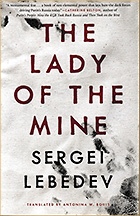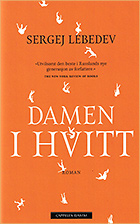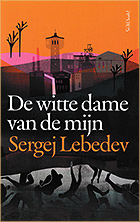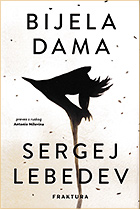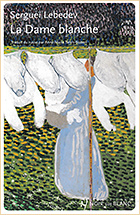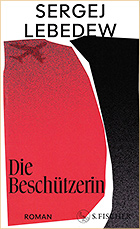Sergei Lebedev
The White Lady. A Novel
Proposal
Rights acquired by
- Fischer Verlag, Germany
- Les Editions Noir sur Blanc, Switzerland
- Cappelen Damm, Norway
- Claroscuro, Poland
- New Vessel Press, USA
Sergei Lebedev’s new novel is dedicated to the early days of the war in the Donbas, where the first “polite men,” the sarcastic name for Russian soldiers without insignia who occupied Crimea, appeared in 2014. The Ukrainians fought, Putin repeated his familiar “it’s not us,” and the world was silent. For the world, the “war” began only eight years later.
This short novel contains not only the circumstances of the lives of residents before and after “the liberation of Russian territories and their Russophone inhabitants,” as the pro-Kremlin press called it, but also the work of these “do-gooders” without insignia. They entered like thieves, rapists, robbers—stealthily. Even the major crash of the Malaysian Boeing and ensuing game of “we weren’t there” was accompanied by marauding—people grabbed whatever they could: money, jewelry, even stuffed toys.
The book’s dramatic events take place on a historical landscape, filled with hidden layers and traces of past violence and crimes. Lebedev in all his novels shows that evil does not appear out of nowhere, that old unpunished crimes attract new ones. Readers of his book will understand how and why Russia, which always claimed to be the chief bastion of anti-fascism, turned into a fascist state before our very eyes. To show how it happened, Lebedev immerses us in the everyday life of July 2014 in a mining settlement in Donbas, just occupied by the Russians.
Eighteen-year-old student Zhanna is forced to return to her home town, Marata, in the Donbas. Her mother Marianna has terminal cancer, and Zhanna must live with her through her illness, which has driven Marianna to madness. She can’t believe that her mother, so strong and agile—the head of the mine laundry, the fairy of soapy lather, her hands scrubbing away any stain—is dying so horribly…. „Zhanna felt the special significance of her mother’s life, which did not correspond to her occupation—the head of the laundry, then a home laundress in the age of washing machines and cleaning agents, which made some people consider her a witch doctor, others a seer, others a witch…“ The white lady. An old man in the queue called her mother a lady, sensing that she did not belong to the crowd, that she was special. And Zhanna had always felt Marianna’s higher calling, even without knowing exactly what it was, but hoping that her mother would reveal herself to her, pass on her gift by inheritance. „Purity is above whiteness,“ Marianna had often said, but now it was as if all the dirt she had laundered throughout her life was returning, „settling in her blackening body and clouded mind.“
Essentially, Marianna is the war’s first victim. The war had not yet begun, but she could already hear the floors of the universe cracking—buildings breaking along the foundations, cows falling into ravines, apple orchards drying out, the middle world—the town cemetery—dropping into the lower word, and the black dust of the slag heap settling everywhere, never to be banished. Even she, the White Lady, could not hold back the onset of the new terrible evil, it was poisoning and killing her.
The shock of her mother’s illness makes Zhanna forget about the seizure of Crimea, about the Russian soldiers who secretly came to Donbas, about the fact that her institute remained in Kharkov, behind the front line. She does not even wonder why her neighbor Valet, after six years in Moscow, suddenly returned home. Zhanna does not know that six years ago her mother, washing Valet’s clothes brought by his mother, their neighbor, found a crumpled gold dental crown in his pocket and traces of fresh blood on his jacket and told the neighbor to get Valet out of the village immediately. Marianna realized that the find was connected with the secret mine, that blood had been spilled there. Now Valet is triumphant: the „old witch“ is dying, and now it is possible to avenge his fear of her, for the shameful escape from home, it is possible to defile her daughter, to feel Zhanna’s fear and submission. The very submission that he had felt with triumph in Moscow, standing shoulder to shoulder with his coworkers in full gear against opposition demonstrators. „He’s a cosmonaut, he’s a man in a helmet with power, he’s a ninja turtle, a superhero, and they’re biomass…. He can snatch anyone from the crowd, no one will intercede, they will only take pictures with their phones, the herd, the sheep… That was the fear he wanted to see in Zhanna’s eyes, but it was too soon; first let her believe him, let her trust him.“ The exhilarating cocktail of strength and power intoxicates him, he realizes that „there will be a day and they will be given the command to pound and knead… to release the bloody juice, to make the human dough rise and be sent into the pan.“ But in the meantime, Valet has a matter of national importance; he must help conceal a rocket launcher that has secretly arrived from Russia.
„The long-awaited order had been given. The administration and police were taken into custody, roadblocks set up on the roads, and a militia battalion created.“ Somehow, almost imperceptibly, the Russian occupiers seeped into the Donbas, bringing turmoil, looting, and stray gunfire. In World War II, Soviet soldiers drank moonshine, took watches and jewelry. Now cognacs and whiskey have become trophies, household appliances and furniture are sent home by car, expensive cars of Ukrainian businessmen are „confiscated.“
The shooting down of the Malaysian Boeing by a missile launcher has become a point of no return for modern European history. (see translation excerpt 1). Zhanna has always loved to watch the mysterious lights of airliners in the night sky, wanting to be onboard a free iron bird, to change her life, to start anew. And now she sees the death of this symbol of freedom, linking countries and continents, sees how “an impossible rain of dead people” sprinkled the outskirts of the town.
The White Lady follows the classical unities. The place of action is a mining village, now infamous around the world as the crash site of the Malaysian Boeing. The time period—five days in July 2014, the tragic starting point of the already ongoing de facto World War III. The protagonist is the White Lady, Zhanna’s mother, one of the „secret sisterhood of the laundresses of existence“ who hold the precarious balance of the world order. There is a chorus in the novel, acting as narrator of the past and present, assessing the actions of the heroes from the moral point of view. He is the moral authority, even if he is a lonely voice of flickering reason, an impossible afterlife witness of the subterranean realm of the dead. His presence is palpable to those sensitive to what „materialism does not explain.“ Years ago, KGB officer Korol gave him the codename „The Engineer.“ A German Jew, the creator of the widest and deepest mine on the continent, he was buried in his creation in 1942 along with tens of thousands of Jews shot by the Germans.
It was then, in late Soviet times, that Korol had spotted Marianna, started an operational case against her, and secretly installed a wire in her house. Rare guests of „Snow White,“ the code name he gave her, did not stay long, but these women had something in common, a special kind of kinship. Korol felt that something connected her to the mine shaft, to “The Engineer,“ something protected her, but he could not prove anything. And thirty years later, sent to Donbas again, he decides to bring this case to an end and to extinguish his passion-hatred, which is sometimes stronger than love.
„Like from a concentration camp,“ said the orderly taking Marianna’s body to the morgue. Zhanna involuntarily thinks of the abandoned mine Shaft 3/4, to the remains of Jews killed by the Nazis and sealed in the mine by the Soviets, the concrete poured into it turning them into „fossils of modern times.“
„The Engineer: We are fossils. Useless fossils.
“Some have been strangled and burned. Others have been shot and then dug up and burned.
“We are measured in weight and volume… And the longer we stay here, petrifying, the harder it will be to bring us to the surface, because we are compressed, soldered, joined together. We become, as a geoscientist would say, a stockwork, an ore body. We will have to be mined, like coal.
“You can’t remember us, because you can’t remember 300 meters of dead people.
“But what should we be called? Hebrite? Jewspar? The philosopher’s stone of the new century, the pure substance of silence?
“We are the language-less horror of the European subconscious. Its deepest cellar, where, like in a leprosarium, the unhealable past is locked away. That which can neither be named, nor be repaired.“
In the 1970s, the young special service officer Korol, who was responsible for the operational maintenance of the grave-mine, could not understand: „Why do they, the big bosses, need so many dead Jews? Why do they keep them? For what? This way it means that the Soviet regime, which defeated fascist Germany, is covering up a fascist crime. These bodies, these dead people should be shoved under the nose of the West: this is what they are like, your Germans, your hatchlings!“
Returning to the mining village to inventory the old State Security archives captured by the Russians, General Korol leafed through 49 volumes of the case that the OGPU, NKVD, MGB, KGB kept on the mine—the twenties, thirties …. fifties, sixties. Polish conspiracy, Trotskyist cell, Ukrainian national underground, saboteurs, White Guards. Handwritten, with horrible mistakes, jumping drunken scribbles.
And how can Jews be exhumed separately, if the other bodies are lifted, “the whole past will come out“? For many decades their remains were mixed with the Red Army soldiers shot by the Germans in the First World War, the inmates of Soviet prisons, and then all in a row–Whites, Reds, Greens, random people, hostages, „enemies of the people.“ All those who were driven through Donbas by the winds of history left behind their dead, and „every subsequent killer knew where the previous ones had killed and where to take the prisoners.“
And now the sealed mine with its terrible contents becomes a place of attraction for new crimes, that axis of evil, which time after time will spew new evil as long as the crimes go unpunished.
All of Sergei Lebedev’s novels are based on true events and archival materials. The giant mass grave in the form of a layer cake of corpses is just one of the places of secret mass graves, including in the Donbas. It is not by chance that the building for punitive agencies (or secret police) never changed its direct purpose, passed from the Russians to the Nazis and back again, and that during the German occupation SD officer König used the office of Korol (Russian for king). The same NKVD-stamped folders, the same re-trafficked agents, the same prison cells, the same torture: a „perpetuum mobile, a chain tautology of violence.“ König, like his Soviet „colleagues,“ searched for conspiracies, circles of saboteurs, and traitors.
The general recalls the story told by a tipsy older colleague about how on the eve of the anniversary of the night of the pogroms in West Germany, Soviet security officers drew swastikas near synagogues so that the world would see the revival of Nazism. And the old general realizes that there is no difference between them; he begins to see swastikas on the ceiling, on the wallpaper, in the folds of the curtains (see translation excerpt 2).
Today’s Russian fascism has grown from the oblivion and justification of all the crimes of the Soviet regime, from historical ignorance and the dismantling of memory. The unquiet spirits of the past are trying to reach out to the living, to warn, to caution, to call for justice and retribution. So far in vain … So far it turns out that only one modern Russian writer, Sergei Lebedev, has taken on the work of many generations to exhume the memory of all the innocently murdered.
„The Engineer: Their divinity has been denied: they were the Red Gods of the age, the victors who saved the world and prevented the end of the world, and they have become archaic, chthonic beings, relics of the past, excluded from the new cycle of creation.
“They invaded in order to turn back time. Theirs is a war of reanimated fossils, of the risen dead, a war against the world order and life itself. Today, as they are driven by the revenge of the marginalized, the revenge of those who have lost that Fata Morgana of universality, their red pelt has faded, changed color, turned brown.
“Yes, they have power. But it is the power of scum, the power of scoundrels, the power of the bottom that ascended and strengthened; the power of the lowlife who suddenly can rise and rule. And this power was doomed to be revealed, to be discovered, to divulge its evil, for that is the law.“
